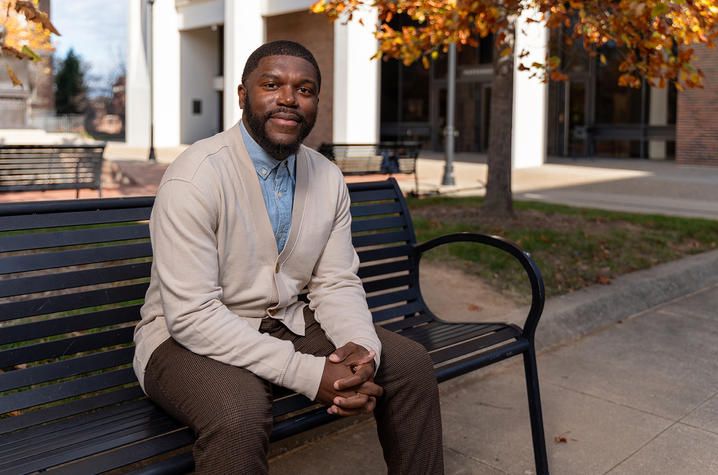UK researcher examines the life and activism of Mamie Till-Mobley, Emmett Till’s mother
Video produced by UK Research Communications. To view captions for this video, push play and click on the CC icon in the bottom right-hand corner of the screen. If using a mobile device, click on the "thought bubble" in the same area.
LEXINGTON, Ky. (Jan. 11, 2024) — In the summer of 1955, 14-year-old Emmett Till traveled to rural Mississippi to visit extended family. Just a few days after his arrival, the teenager was abducted, beaten and lynched after being accused of offending a white woman in a grocery store.
Following his brutal murder, his mother, Mamie Till-Mobley, decided to hold an open-casket funeral in their hometown of Chicago. The photo of her son’s corpse was first published in Jet magazine, bringing nationwide attention to the brutality and racial violence.
Brandon M. Erby, Ph.D., assistant professor in the Department of Writing, Rhetoric, and Digital Studies in the UK College of Arts and Sciences, is studying the life of Till-Mobley following that decision — which became a pivotal moment for the Civil Rights Movement in the United States.
“We always see Mamie Till-Mobley in this moment of her son's funeral and opening that casket. It’s a powerful and important way of seeing her,” Erby said. “But I’m also thinking about what she was doing in the 45-plus years from the moment her son is killed up until her death in 2003.”
Erby was awarded a 12-month Career Enhancement Fellowship from the Institute of Citizens and Scholars in the summer of 2023. His forthcoming book will examine how Till-Mobley continued to commemorate her son’s life after the historic casket decision and how her work is relevant to contemporary issues.
“My project is tracing her not only as a mother but as an activist, an educator, a lobbyist in political fights for racial justice and really thinking of her as a foremother,” Erby said. “Rosa Parks, for instance, was also critical in thinking about how Emmett Till’s murder could motivate people to pursue social justice and activism work.”
Parks was arrested in Montgomery, Alabama, on Dec. 1, 1955, for refusing to give up her bus seat so that white passengers could sit in it — just a few months following the murder of Emmett Till.
After graduating from college in 1960, Till-Mobley became an educator and mentor to underserved students in the south side of Chicago. She also started a program in her elementary school and church called the “Emmett Till Players” — an oratorical group for young kids where they were learning, memorizing and reciting speeches of Martin Luther King Jr. She worked with the students on their public speaking and literacy skills and taught them life lessons on surviving as black adolescents in the United States.
“She was thinking about education as a way of not only inspiring other generations but keeping the name of her son and his legacy alive.”
"The Face of Emmett Till,” written by Till-Mobley and David Barr, is a true-to-life dramatization of the murder of Till, the aftermath, and the journey for justice that his mother crusaded in the years that followed.
“This play gives us Till-Mobley's perspective of what happened in this case, from the time that she is preparing him to go down into Mississippi and to understand the racial codes and the cultural milieu there, up until she is deciding to have an open-casket funeral, and what she is doing decades later in her Civil Rights work,” Erby said.
In 2022, the Emmett Till Antilynching Act became law, defining lynching as a federal hate crime. This past summer, President Biden signed a proclamation designating an Emmett Till and Mamie Till-Mobley National Monument in both Illinois and Mississippi.
“Although we cannot bring Emmett Till back, I think there are still ways for us to achieve justice,” Erby said. “Sometimes justice can mean accountability. Sometimes justice can mean action. And what we are seeing in this moment is that there is a committed response to making sure that Emmett Till and his mother are remembered in our national landscape. It’s a lot of different moving parts with this story that I am happy to tell through the lens of Mamie Till-Mobley.”

As the state’s flagship, land-grant institution, the University of Kentucky exists to advance the Commonwealth. We do that by preparing the next generation of leaders — placing students at the heart of everything we do — and transforming the lives of Kentuckians through education, research and creative work, service and health care. We pride ourselves on being a catalyst for breakthroughs and a force for healing, a place where ingenuity unfolds. It's all made possible by our people — visionaries, disruptors and pioneers — who make up 200 academic programs, a $476.5 million research and development enterprise and a world-class medical center, all on one campus.




